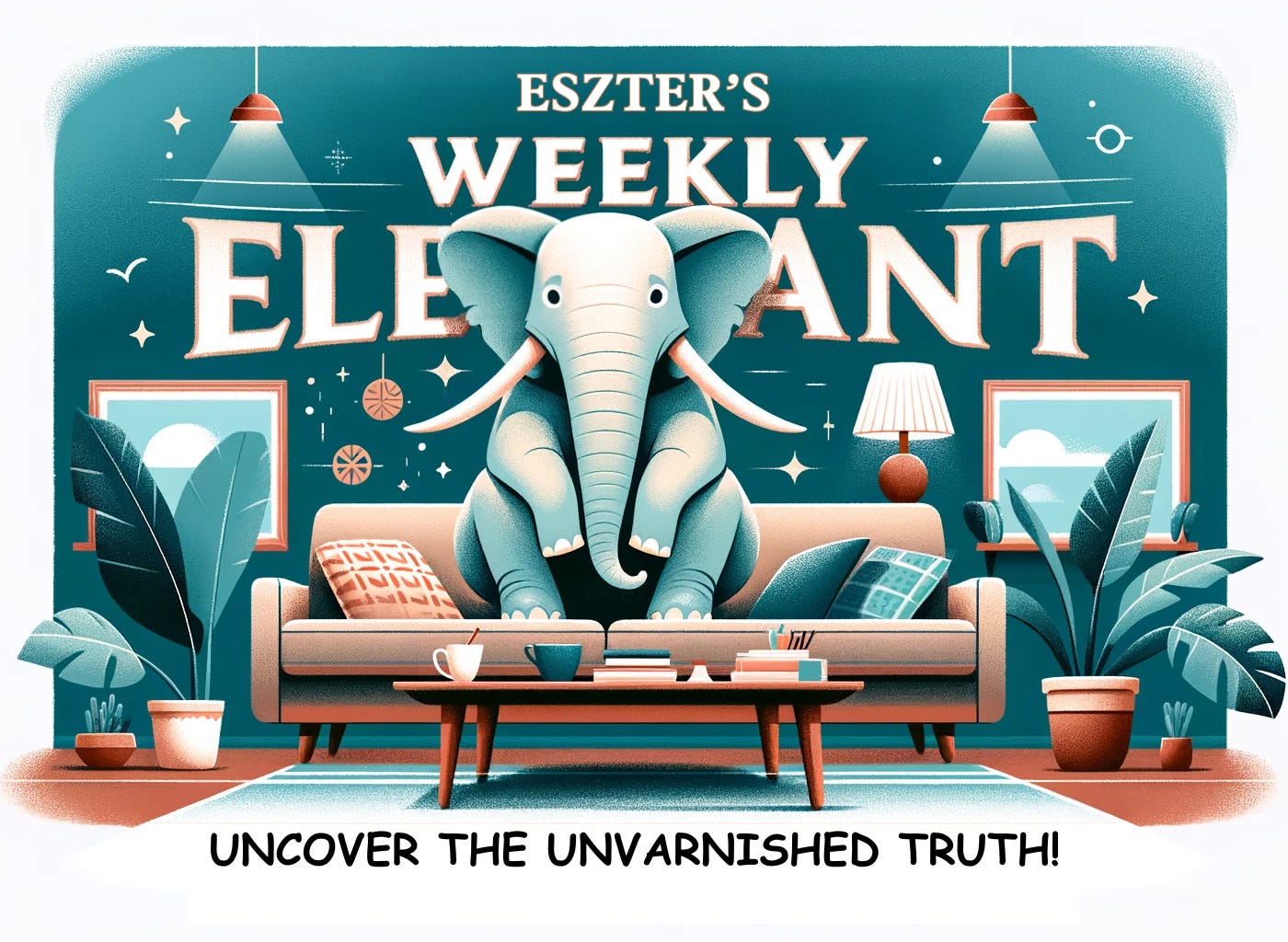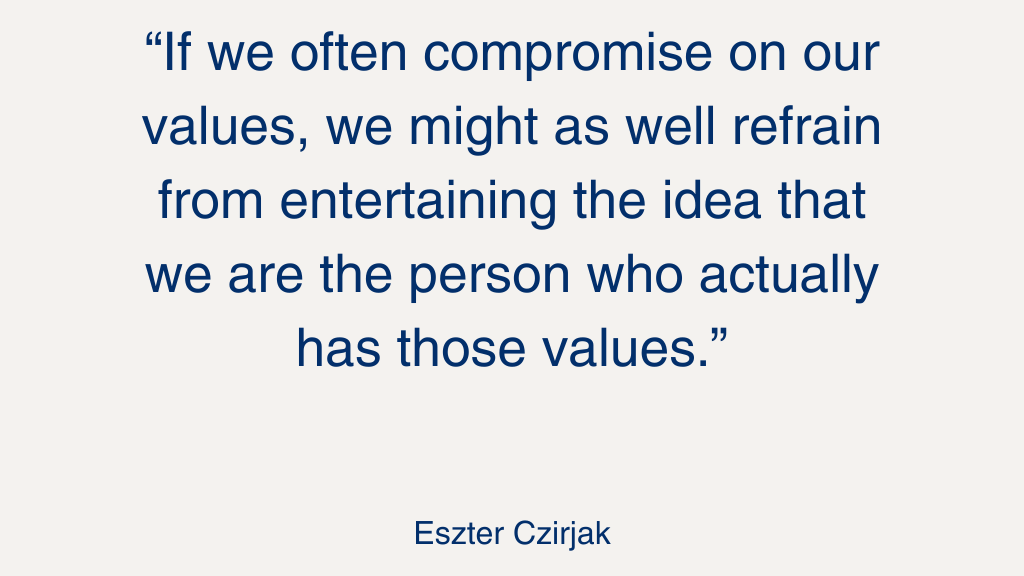Eszter's Weekly Elephant: Issue #2
Uncover the unvarnished truth and discover yourself!
Welcome to the second issue of Eszter's Weekly Elephant! We hope you'll find the content here both intriguing and enjoyable!
As promised earlier, we will summarize the topics we've covered each week. However, since there are still many articles on the substack that haven't been discussed yet, this second issue aims to catch up on the subjects we've explored.
So, let's dive in!
As for me, I've always been fascinated by family stories, and when I learned about family constellations in my adulthood, I realized that these stories are worth examining not only because they are exciting but also because they shed light on a myriad of connections, not just within a family's history but often within the history of humanity. They also hold the key to solving many problems, whether they are related to health, relationships, difficult parent-child dynamics, struggling careers, finances, or persistently ailing pets. Frequently, we can find the causes in family stories, and through them, we can find solutions.
I'm aware that some may respond to this by calling it nonsense, but fortunately, my work with over a thousand people has convinced me otherwise. Thus, I'm more inclined to trust my own eyes than any theory.
One of the most exciting articles discusses transgenerational traumas. Those who have never delved into this topic will immediately grasp its essence upon reading. It's worth pondering the stories circulating within our families, identifying who the black sheep are, and who has faced a challenging fate.
Without employing any particular technique, we can often discover simple connections between events in our family history and our everyday struggles. For example, we may notice how medical professionals in a family often talk about the same person in the family history who couldn't be healed. It's a reasonable assumption that, very probably, every family member working in the medical field chose their profession due to a subconscious motivation to save that person, even if they have long passed away. Similarly, in families dealing with financial issues, there's always someone who was wealthy but was condemned or even ostracized by the family for some reason. By rejecting that wealthy family member, the family unconsciously rejects the pattern of prosperity as well. Some patterns are easier to pinpoint, while others are not as evident. For those interested in this topic, here is the article:
What are transgenerational traumas, and how the challenging fates of our ancestors influence our lives today?
From my experience, many problems often root back to some form of transgenerational trauma. In the Hellinger system, this means that we struggle in the present because, at some point in the past, one of our ancestors established a family law or belief regarding a certain topic.
Working with clients has revealed numerous fascinating connections, including the possibility that transgenerational trauma could be the cause of infertility, both in men and women. Of course, there are situations where this is not the case, but when all medical reasons have been ruled out, it's worth exploring the psychological origins of the problem. In this regard, the following articles on the causes of male and female infertility can provide valuable assistance:
Possible causes of infertility in men
Just as in women, emotional and psychological reasons can contribute to infertility in men. What might cause such issues? The root of infertility in both genders can arise from anywhere: from transgenerational traumas to personal life experiences. If a couple is medically healthy and there is no apparent reason the woman can’t conceive, it’s worth examining whether there are any emotional factors in the man that might be hindering conception.
Causes of Infertility — Transgenerational Traumas
One of the most challenging and profound pain is when a woman, no matter how much she desires, is unable to become a mother. Even if medically everything is in order, conception often remains difficult. In such situations, it’s worth giving introspection, family constellation or other psychological methods a chance, as it might lead to a solution.
For those who feel completely overwhelmed by stimuli within just two hours, even at the smallest social gatherings, and who can't wait to get home to sit silently on the couch, gazing into space, the article on super-sensitivity might offer relief.
This article sheds light on the reasons behind this rapid exhaustion and helps us see ourselves more clearly. Back when I discovered research on super-sensitivity, it not only reassured me that I'm not abnormal but also made me appreciate the positive aspects of this condition. I learned to manage my energy much better and found the best ways to recharge after draining days.
Super-sensitivity — Curse or Blessing?
Many feel like they are outsiders because they are deeply affected by things that barely register for others. In such instances, they often hear comments like “Don’t take it to heart!” or “Be tougher!” or “You need to be more selfish!” They stand perplexed before these seemingly incomprehensible directives, feeling as if something is very wrong with them. However, the super-sensitive, often labeled as weak or hysterical, are very valuable both for society and their immediate environment.
I often hear people say, "Why bother with traumatic childhood experiences? It's better to forget them." This may sound reasonable, but unfortunately, my experience has shown that without processing these events, we expose ourselves to greater risks than if we were willing to release the associated emotions and heal ourselves. This theory is substantiated by research in which adults who had traumatic experiences in childhood were monitored over an extended period. The results were surprising and highly thought-provoking. It's worth reading:
Can Childhood Trauma Lead to Serious Adult Illnesses?
Childhood traumas have much more serious effects on adult health than we previously thought. How can the negative effects of a troubled childhood be mitigated? Childhood traumas have far-reaching consequences on adult health. A study conducted in the mid-1990s, which assessed the health and mental state of 17,000 adults, found a significant correlation b…
Childhood traumas can take various forms. Most people think of traumas such as physical abuse or sexual abuse, but deprivation traumas affect just as many individuals as those where there was an excess of something, like sexuality or aggression. This article delves deeper into what deprivation traumas are:
Deprivation Traumas and Their Surprising Consequences
When we typically hear the word trauma, what usually comes to mind is an event that overwhelms the human nervous system with an excess of something. Much less often do we consider the type of trauma where there is an insufficient amount of something. However, this also exists, and indeed it does!
How to Begin Healing from Childhood Sexual Abuse?
Many have approached me regarding the aftermath of childhood sexual abuse they grapple with. The effects can be manifold, often tracing back to this type of trauma in ways one wouldn’t initially realize. Among the adult consequences of childhood sexual abuse are:
In our experience, one of the most challenging situations in human relationships is when a loved one goes through a tough, challenging situation that can disrupt their entire life. In such times, most of us awkwardly attempt to offer some form of help, but things often become quite uncomfortable. To learn how we can be there for someone in the right way, read the article “What to say when the unspeakable happens?”
What to Say When the Unspeakable Happens?
We can all find ourselves in situations where the life of someone who is very important to us turns upside down. Their partner dies, they suffer a serious accident, a sick child is born, their house burns down, or they discover they have a terminal illness. What should we do in these situations?
As always, every second article is accessible only to our paying subscribers, so if you haven't already, it's worth upgrading. Not only we but also other family members will be grateful for the financial support :)
Now, let's move on to the part of Eszter’s Weekly Elephant dedicated to book lovers!
This week, in our literary publication, Eszter's Reading Nook, we present some truly exciting things for you, dear readers! For the short story titled “Masquerade Ball," you'll find a guide that provides more details about the life situation depicted in the story, our related experiences, and it even includes a quick self-awareness exercise. We hope you'll feel inclined to give it a try, as many have found it to be quite enlightening!
Similar to Eszter's Weekly Elephant, in Eszter's Reading Nook, every second short story, guide, and book review is exclusively available to our paying subscribers. Therefore, it's worth upgrading to paid subscription to read the second short story, which is about the life of a teddy bear and holds an exciting twist! The accompanying guide, as always, contains interesting insights into the story, personal experiences, and yet another self-awareness exercise.
Our time and attention are valuable! Learn from the guide how not to waste them recklessly!
Eszter’s Magic
In addition to our publications, Eszter's Weekly Elephant and Eszter's Reading Nook, we have also launched a third publication titled Eszter's Magic. Here, we will touch on more personal topics, share literary "bonbons" - short stories distilled to a mere 150 words - and introduce you to the path and methods that led us to unleash our creativity. For those interested in who we are, how we see the world, and what happens to us, subscribing to this publication is also worthwhile! Check out the first two stories:
All that remains is to include our weekly quote. Ponder upon it! :)
We hope the above has sparked your interest in reading! If you have any questions, we are happy to answer them!
Happy reading!
← Previous Issue of Eszter’s Weekly Elephant | Next Issue of Eszter’s Weekly Elephant →
Disclaimer: The content in our publications should not be considered professional psychological or psychiatric advice. Therefore, everyone reads the articles and applies their content at their own risk.
Home | Notes | Articles | Eszter’s Magic | Literary Bonbons | Short Stories and Guides | Beyond the Book | EWE Issues | Archive | About













I knew your Substack would be gold! So glad I discovered your work. For now, kick back and enjoy the spoils of your complete and total victory. While you’re doing that, I’ll put together a few suggestions for collaborations we could do together. Of course you’d have final veto powers… Keep up the great work, Eszter!